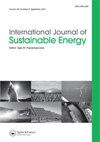Development of PV hosting-capacity prediction method based on Markov Chain for high PV penetration with utility-scale battery storage on low-voltage grid
IF 2.7
Q4 ENERGY & FUELS
引用次数: 0
Abstract
The previous stochastic hosting capacity prediction method using the Monte Carlo method for high photovoltaic (PV) penetration with a battery energy storage system (BESS) required a large number of computations to achieve the expected accuracy. The problem of high computational load must be addressed so that the electrical distribution planner can practically use the PV hosting capacity prediction in actual situations. Therefore, this study developed a Markov-chain-based PV hosting capacity prediction method for high PV penetration using BESS. The proposed method is described in detail, followed by case and validation studies. The obtained hosting capacity was 123.58 kW, which increased to 3676.4 kW after the utility-scale BESS implementation. The results demonstrate that the proposed Markov-chain-based PV hosting capacity prediction method outperforms the Monte Carlo method, which is the most popular stochastic hosting capacity method, in terms of accuracy and computational cost.基于马尔可夫链的低压电网高渗透率光伏发电容量预测方法研究
以往基于蒙特卡罗方法的高光伏渗透率电池储能系统随机承载容量预测方法需要大量的计算才能达到预期的精度。为了使配电规划人员能够在实际情况中实际使用光伏主机容量预测,必须解决计算负荷大的问题。因此,本研究基于BESS开发了一种基于马尔可夫链的高光伏渗透率光伏托管容量预测方法。详细介绍了该方法,然后进行了案例和验证研究。获得的托管容量为123.58千瓦,在公用事业规模的BESS实施后增加到3676.4千瓦。结果表明,本文提出的基于马尔可夫链的光伏装机容量预测方法在精度和计算成本方面都优于蒙特卡罗方法。蒙特卡罗方法是目前最流行的随机装机容量预测方法。
本文章由计算机程序翻译,如有差异,请以英文原文为准。
求助全文
约1分钟内获得全文
求助全文
来源期刊

International Journal of Sustainable Energy
ENERGY & FUELS-
CiteScore
5.70
自引率
3.20%
发文量
52
期刊介绍:
Engineering and sustainable development are intrinsically linked. All capital plant and every consumable product depends on an engineering input through design, manufacture and operation, if not for the product itself then for the equipment required to process and transport the raw materials and the final product. Many aspects of sustainable development depend directly on appropriate and timely actions by engineers. Engineering is an extended process of analysis, synthesis, evaluation and execution and, therefore, it is argued that engineers must be involved from the outset of any proposal to develop sustainable solutions. Engineering embraces many disciplines and truly sustainable solutions are usually inter-disciplinary in nature.
 求助内容:
求助内容: 应助结果提醒方式:
应助结果提醒方式:


